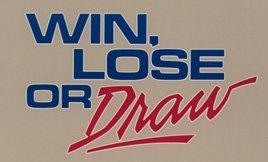| Hole in the Wall | |
|---|---|
 | |
| Genre | Game show |
| Directed by | Ron de Moraes (Fox) Rob George (Cartoon Network) |
| Presented by | Brooke Burns; Mark Thompson (2008-2009 Fox version) Teck Holmes (2010-2012 Cartoon Network version) |
| Country of origin | United States |
| Original language(s) | English |
| No. of seasons | 1 (Fox) 4 (Cartoon Network) |
| No. of episodes | 18 (8 unaired) (Fox) 40 (Cartoon Network) |
| Production | |
| Executive producer(s) | Cecile Frot-Coutaz (Fox) Scott St. John (Cartoon Network) |
| Producer(s) | Jon Peper David Ruskey (game producer; Fox) |
| Editor(s) | Narumi Inatsugu |
| Camera setup | John Perry |
| Running time | 22 minutes |
| Production company(s) | FremantleMedia North America |
| Distributor | FremantleMedia Enterprises |
| Release | |
| Original network | Fox (2008–2009) Cartoon Network (2010–2012) |
| Original release | Original series: September 7, 2008 – March 15, 2009 Revived series: October 6, 2010 – January 19, 2012 |
Hole in the Wall is an American game show that has aired in two versions on American television.
Contents
- Fox version (2008–2009)
- Game play
- Broadcast history
- Special episodes
- Cartoon Network version (2010–2012)
- Game play 2
- Catchphrases
- Amazon Prime Video
- References
- External links
The first version aired on the Fox television network from 2008 to 2009. The show was an adaptation of the Japanese game Nōkabe(脳カベ) (meaning Brain Wall , nicknamed by YouTube fans as "Human Tetris") [1] in which players must contort themselves to fit through cutouts in a large 13 feet (4.0 m) by 7.5 feet (2.3 m) Styrofoam wall moving towards them on a 50 feet (15 m) track. FremantleMedia North America produced the series. Brooke Burns and Fox announcer Mark Thompson were the hosts of this version. On May 20, 2008, Fox announced that it would commission 13 hours of Hole in the Wall from FremantleMedia North America. According to a Hollywood Reporter report, these hours could be split and aired as 26 episodes. Production began July 13, 2008 at CBS Studios-Radford. On March 17, 2009, Fox pulled the series again, replacing it with reruns of King of the Hill and American Dad! . [2] The program's cancellation was announced in May 2009. [3]

The Fox Broadcasting Company is an American commercial terrestrial television network that is a flagship property of the Fox Corporation. The network is headquartered at 1211 Avenue of the Americas in New York City, with additional offices at the Fox Broadcasting Center and at the Fox Television Center in Los Angeles.
Brain Wall is a component of the Japanese game show The Tunnels' Thanks to Everyone. Video clips from the show proliferated on video-sharing websites and the concept was eventually adopted by several countries. It became popularly known to non-Japanese speakers and YouTube fans as simply Human Tetris or Hole in the Wall, named for its involvement of the physical body and a supposed close resemblance to the rules of the video game Tetris.

YouTube is an American video-sharing website headquartered in San Bruno, California. Three former PayPal employees—Chad Hurley, Steve Chen, and Jawed Karim—created the service in February 2005. Google bought the site in November 2006 for US$1.65 billion; YouTube now operates as one of Google's subsidiaries.
On July 20, 2010, Cartoon Network announced that it picked up the series, now updated for its younger audience. [4] [5] FremantleMedia would return as the show's producers. The series premiered October 6, 2010, with Real World Hawaii cast member Teck Holmes as host. Joining him as the show's lifeguard was model/lifeguard Emily Hedicke. A second cycle debuted in April 2011, and features a new co-host, lifeguard Aaron Gingrich. On January 19, 2012, the CN version of Hole in the Wall aired its last episode. [6]

Cartoon Network is an American pay television channel owned by Turner Broadcasting System, a subsidiary of AT&T's WarnerMedia. The channel was launched on October 1, 1992, and primarily broadcasts animated television series, mostly children's programming, ranging from action to animated comedy. It operates usually from 6:00 AM to 8:00 PM (ET/PT) and is targeted at children in between 7-15. Its overnight daypart block Adult Swim is aimed at adults and is treated as a separate entity for promotional purposes and as a separate channel by Nielsen for ratings purposes. A Spanish language audio track for select programs is accessible via second audio programing (SAP); some cable and satellite companies offer the Spanish feed as a separate channel by removing the main English-language audio track.
Emily Hedicke is an American actress. She appeared as co-host and lifeguard in the Cartoon Network show Hole in the Wall.
















